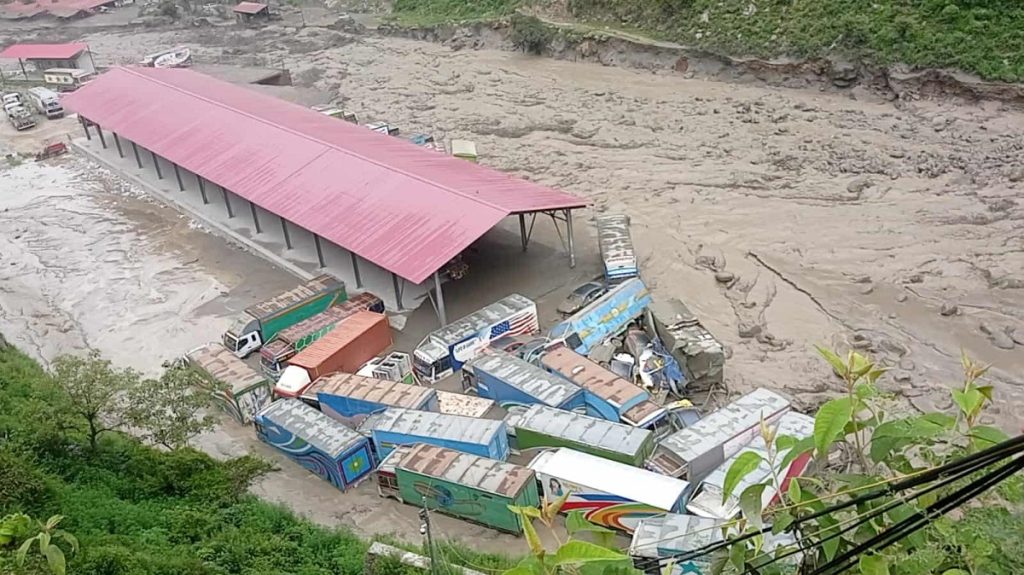The recent flooding in Rasuwa, Nepal, has had significant consequences on cargo transportation and power generation, sparking concerns about logistics in the region. With the loss of over 100 cargo vehicles and disruption of power projects, the impact on the local economy cannot be understated.
Overview of the Flooding Incident
In a preliminary assessment, the floods at the Rasuwagadhi customs yard and the under-construction Timure dry port resulted in more than 100 cargo vehicles being swept away. Many of these vehicles were reportedly loaded with goods, adding to the logistical nightmare. Fortunately, electric vehicles parked further from the flood zone fared better, with minimal damage noted.
According to Ashish Gajurel, Executive Director of the Nepal Intermodal Transport Development Board, while an exact count is pending, preliminary estimates already suggest significant losses. Gajurel stated, “The initial estimates indicate over 100 vehicles have been carried away.” Out of the approximately 230 vehicles parked in the customs vicinity, some were moved to higher ground before the flood struck. Ongoing assessments will provide further clarity on the damages incurred.
Impacto na logística
The effects of this flooding incident signal important repercussions for logistics in Nepal. Disruptions of this magnitude highlight vulnerabilities within the infrastructure supporting cargo transportation and trade. The substantial loss of vehicles will undoubtedly lead to delays in the delivery of goods, affecting businesses and consumers alike.
Moreover, logistical planning must accommodate these types of unpredictable natural events. Service providers, such as GetTransport.com, are poised to adapt to changes in logistics demand. This platform not only offers affordable global cargo transport solutions, but is also versatile enough for various applications including office moves, home relocations, and moving oversized items.
Power Production Disruption
Beyond impacting cargo logistics, the flooding also halted power generation in the area. Hitendra Dev Shakya, Managing Director of the Nepal Electricity Authority, confirmed that a total of 200 megawatts of electricity production has been suspended due to flood damage. Major power projects including the Rasuwagadhi Hydropower Project and the Trishuli 3A Hydropower Project have faced major setbacks.
In the case of the 111 MW Rasuwagadhi Hydropower Project, one of the dam’s gates was damaged, and access to the project site has been restricted due to the destruction of connecting bridges. Despite the powerhouse itself remaining intact, the heavy debris accumulation poses challenges for operations moving forward.
The Trishuli 3A project encountered similar difficulties, with floodwaters penetrating its structures, and the Trishuli 3B substation being rendered inoperable due to mud accumulation. Consequently, logistical adjustments will be necessary not just for transport but for energy distribution, affecting businesses relying on consistent power for operations.
Humanitarian Concerns
Tragically, the floods have led to human casualties, with reports indicating that several individuals are missing. Joint rescue efforts are ongoing, with multiple agencies involved in the search for missing persons, including police officers and civilians from affected areas. As the floods stemmed from heavy water flow from the Chinese side, understanding cross-border implications on logistics and transport is essential.
This highlights an inherent challenge faced during natural disasters: not only managing the logistics of cargo but also ensuring public safety and efficient recovery efforts. Historical data reveals that transportation systems may struggle to recover promptly post-disaster, exacerbating delays in supply chains.
Conclusão e considerações futuras
The events in Rasuwa underline the importance of resilience and flexibility within logistics and transportation frameworks. As businesses and individuals assess the damage and navigate logistical hurdles, platforms like GetTransport.com can provide cost-effective and reliable storage and transport solutions. The versatility of their services enables efficient response tailored to immediate needs, whether it be for moving cargo or large items.
In summary, the floods in Rasuwa have not only disrupted transportation logistics but also raised significant concerns regarding power production and public safety. While the impacts are severe, proactive measures and timely logistical adjustments can mitigate further disruptions. For those needing to adapt their transport logistics in response to these changes, exploring the comprehensive solutions that GetTransport.com offers could facilitate smoother transitions during recovery.
Stay informed about market trends and impacts on international logistics, as they highlight the necessity for adaptability in the ever-evolving landscape. Book your cargo transportation with GetTransport.com today! GetTransport.com

 Fortes inundações perturbam o transporte de carga e a produção de energia em Rasuwa, no Nepal">
Fortes inundações perturbam o transporte de carga e a produção de energia em Rasuwa, no Nepal">